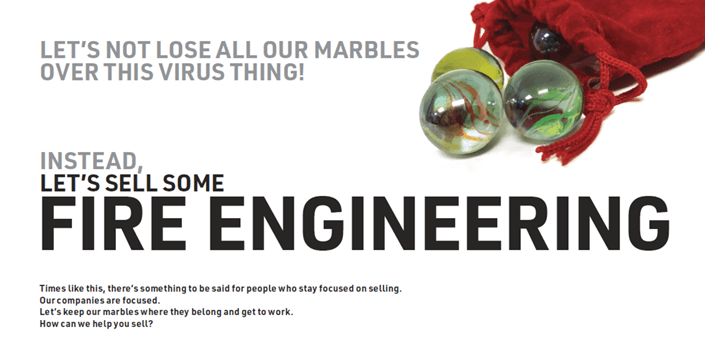Everyone knows what’s happening to business with coronavirus, but I haven’t read or heard much on what to do from a business point of view, except social distancing yourself. Or wash your hands. Or shelter in place. All personal stuff.
Unfortunately, if you stop business, you stop life.
I heard today that the government should pour as much money as they can into the situation to “save business.”
Respectfully, that’s not going to work. The government doesn’t have enough money – our money by the way — money that comes from our businesses.
The only thing that will work is wanting to do business. Then doing it.
In other words, get to work.
But, work is hindered when we are told things like, “In some cases I am choosing between saving people’s lives and saving people’s livelihoods. Ultimately you can’t have a livelihood if you don’t have a life.” This is what Illinois Governor Pritzker said when he issued a “stay-at-home” order for Illinois, which is the state we work in.
What kind of life will you have if you don’t have a livelihood?
That’s something I really don’t want to think about.
Closing the Gap in Business Distancing
In a digital society where many businesses have migrated to a digital highway of interaction, I find the reaction to coronavirus from a business point of view startling. And repugnant.
One client VP told me his staff was looking at the situation as “two weeks paid leave without work.”
Another client can’t decide what to do because his governor keeps changing the rules.
Business will only stop if you stop it. Whether you are the CEO, the line person, the shipping person, or whatever, you, as an individual, will make that decision.
A quote from Ralph Waldo Emerson’s essay Self Reliance is in order:
“Power is in nature the essential measure of right. Nature suffers nothing to remain in her kingdoms which cannot help itself. The genesis and maturation of a planet, its poise and orbit, the bended tree recovering itself from the strong wind, the vital resources of every animal and vegetable, are demonstrations of the self-sufficing, and therefore self-relying soul.”
The same holds true of business. Emerson said in the same essay: “Do that which is assigned you, and you cannot hope too much or dare too much.”
Instead of letting epidemiologists dictate business conditions, we should listen to our own voice. If we are truly in a digital world, what’s the hang up?
Six Things You Can Do Now to Close Business Distancing
Here are six things you can do now digitally to help your business through these disruptive events.
- Hold CEUs. Continuing Education Units are a great way to help your clients expand their product knowledge to key markets like architects, engineers, interior designers and other professionals.
- Help your Clients Sell. When companies cut back on face-to-face meetings, take the meeting to them virtually. Setting up sell sessions can be a boost to people who are under the same conditions you are. For example, we’re creating “Shelter in Comfort” showroom presentations for our clients. It’s actually fun.
- Read and Share Information. Forget about Coronavirus, since most people say, “We don’t know.” Business thrives on positive information – not negative. Look for stories of inspiration, including about the virus. One client texted me this article, Why this Nobel laureate predicts a quicker coronavirus recovery: ‘We’re going to be fine,’ from LA Times. I shared it with our people.
- Publish a White Paper. Our company is really more than one company. Since 1990, we have diversified. That is one of the main reasons we are still standing after disruptive events like 9/11, 2009 Depression, or this Virus thing, which in my opinion, is the worst of the three. For example, we recently published a report on a-i-m.com, our sister Accountability Information Management, Inc. website that does market research, on an innovative way to do specification analysis about door hardware.
- Talk about something other than coronavirus. If you do have to talk about it, talk about it in a positive way, how to overcome business obstacles. Don’t be the victim. Be the liberator.
- Promote your business and remind your clients what you do. To maximize your business today, you need to have an online — and offline — presence. Stay in front of your customers, so that when they’re ready, they can find you. Promote your knowledge through mailers and eblasts. For example, we sent out a mailing to our clients through the USPS. It arrived in a white envelope. The label on the outside looked like this:
Inside there was a small bag of four marbles in a bag with the Interline logo on it, along with a note inside.The card looked like this, where the words “FIRE ENGINEERING” was a variable based on the client’s product or service. For each client, the word changed.
The backside of the card looked like this:
It will be interesting to see if we get any response from these activities. I called some clients and they are “working from home.” Oh well…
I know the mailing (when they do get it) will make most of the people we sent it to smile – and smiling is how you overcome Coronavirus.
A virus can’t stand it when you laugh at it.
Bottom Line
I’m all in for social distancing, but totally against business distancing. It is really up to each of us to do the right thing, and for business that means selling something.
As our friend Emerson noted:
“A political victory, a rise of rents, the recovery of your sick, or the return of your absent friend, or some other favorable event, raises your spirits, and you think good days are preparing for you. Do not believe it. Nothing can bring you peace but yourself. Nothing can bring you peace but the triumph of principles.”
Or as David Ogilvy said many years ago, “We Sell. Or Else.”
I’m for selling, not “or else.”
What about you?




Those of us in sales and marketing can and should continue to work as best we can. We’re lucky in that respect. But there are business that, by their very nature, must rely on contact with real people. Restaurants can offer carry-out meals, but there’s no way to ‘virtually’ stay in a hotel. A masseuse or a barber can’t ‘work from home’ and visit clients via the internet.
True, people in these businesses can continue to market themselves, sort of: “Don’t forget to come and see me when the orders are lifted and you need a haircut!” But that doesn’t help bridge them through the here and now, especially when nobody knows how long this will last. How much should you spend to promote your business when you don’t know if you’ll be able to service clients again in a week, a month, or a year?
The economic impacts of the pandemic are real and devastating, and some aspects are simply beyond anyone’s control. It’s important and necessary to encourage everyone who can to stay engaged and keep to ‘business as usual’ to the greatest possible extent.
But for some people, unfortunately, that’s not possible, and no amount of encouragement will change their reality.
Pete, always solid comments. Appreciate it. Jim Mattis is quoted on this year’s Interline calendar. The quote for March is “It is idiotic and unethical to not take advantage of accumulated experiences.” I would revise that to say: “It is idiotic and unethical to rely on just accumulated data.” As Dostoevsky said, “Man is not a math formula.” And neither is business.
Keep up with the Great thoughts and a great attitude.
Staying positive and getting creative is what is required! Always, but especially now!
Devora, thanks for the comment and reading the post. You write on your website about your craft, “It is a dance that usually requires a partner or a team, and much practice.” And that’s exactly what we need to fight this virus thing! Thanks again, and let’s dance!
I’m in favor of abolishing the term “social distancing” and replacing it with the more accurate “physical distancing.”
Social distancing implies little or no communication; we are all social animals – especially those of us in the sales/marketing profession.
There are lots of ways to communicate with customers in spite of lockdowns, sheltering in place and restricted visitation (another bad one).
Let’s go!
Tim, thanks for the comment! I’m in. That might mean we ban Olivia Newton-John’s “Let’s get physical, physical” https://www.youtube.com/watch?v=vWz9VN40nCA for awhile. 🙂 We sell, or else!
Jim, I am in complete agreement. “Stay close to your customer and you will always have food on your table”. Thanks for the inspiration!
Bill, thank you for reading the post, and let’s keep food on that table! Let us know how we can help!
We are seeing more access to clients than we normally do. We will see how much acutal business it turns into, but spending time with clients is always a good thing.
Always good to hear from you Tony! Access is a good thing.